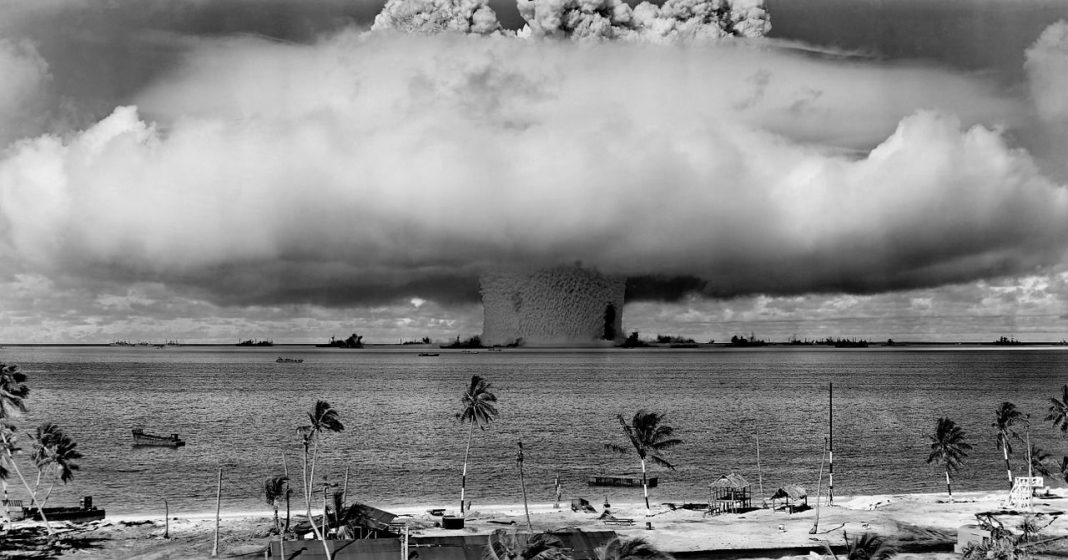Tuesday night President Trump delivered the State of the Union (SOTU) address, speaking for an hour and a half about everything from the border wall and fair-trade practices, to national security, withdrawing from wars in the Middle East, and the cancelation of the INF (Intermediate-range Nuclear Forces) Treaty. He told not only the practical and political conditions of these topics as his administration sees them, but also what action he and his administration intend to take regarding each item.
Putting all of this together and divining the possible outcomes of variables is not an exact science to say the least and can even be a bit like fiction writing in some instances. No one can see the future. We can, however, acknowledge a set of possible outcomes and prepare for each possibility, both mentally and pragmatically.
In this article I will not address each point of the SOTU, but focus on those relevant to the topic of a previous article, “Is a New Cold War Looming?” published February 4 on The Bibb Voice.
What are some of the variables to consider and their possible outcomes?
President Trump said in the SOTU, “We followed the agreement and the rules to the letter. Russia repeatedly violated its terms.”
He also said, “Perhaps we can negotiate a new agreement adding China and others, or perhaps we can’t. In which case we will outspend and out innovate all others by far.” The second scenario is an arms race. A new Cold War. Well, hopefully it would stay cold and not take the horrible turn to missiles actually launching.
One bit of good news related to all of this is that NATO members are now paying “their fair share” which seems to have settled tensions to a degree between the President and our allies. That gives some stability that otherwise could have turned to chaos. Foreign affairs are a delicate balance of egos and economies, with militaries sitting in wait.
Will There Be a New Nuclear Treaty?
Given that the President strives to resolve trade imbalances between the United States and other nations such as China, perhaps politically tying in new trade agreements with new arms agreements makes sense? It is a stated fact that China has amassed a large military force, and continues to build and add medium-range missile locations all over their country. If dissolving the existing INF Treaty with Russia enables the U.S. to take a stronger stance and thus bring China to the table with Russia to discuss a resolution, it could be a good thing.
Scenario 1
Let us consider that a new treaty is formed involving Russia, China, and the United States. New nuclear weapons production is halted, existing arms are set aside, and tensions ease. Great! Let’s all rejoice in peace and prosperity as no doubt this scenario also involves a balanced trade agreement between the U.S. and China. We could possibly expect a rise in domestic manufacturing, a continuation of net positive exports of energy – something the President touted during the SOTU – and the United States staying at or near the top of the world economies with a strong GDP (Gross Domestic Product). Little pink houses and white picket fences for everyone! You and your 2.5 children can continue to play with your Golden Retriever at Saturday picnics in the local park, and everyone lives in the blissful Pleasantville that is the American Dream. I joke with hyperbole, but this would actually be the best possible outcome.
But, what if a new treaty isn’t reached, exactly?
Scenario 2
Perhaps a trade agreement is made with China, and economic prosperity befalls us, but an INF Treaty replacement isn’t reached with Russia? That leaves us with tons of capital to pour into the military machine, accelerating the arms race with Russia and basically taking us into the 1980’s, where millionaires drove Lamborghinis 150mph along sparsely traveled rural midwestern roads, right past underground nuclear missile silos that housed the weapons of possible global annihilation. Sounds fun, right? This would be a Cold War to brag about.
A “state of the art missile defense system” is already in the works, according to the President. So, we’re already on track to making this one happen. The standoff of nations, bolstered by strong economies, building weapons and sitting there like children in a school yard yelling insults at each other and inviting the other to “throw that rock and see what happens.” Nothing good really happens in this scenario. We would live in tension and conflict internally and externally as a nation.
The best we could hope for would be maintaining a “cold” status to the “war” and pushing for a new treaty at some point down the road that would back us into Scenario 1. At worst, tensions rise continuously until either we fall into a new civil war because of internal conflict, or external conflict pushes the button and turns the war from cold to hot.
Scenario 3
What if no agreements are reached with anyone? What if no trade agreement is reached with China? What if no INF replacement is reached with Russia? What if our economy slows again as tensions and prices follow each other upward?
In this scenario we don’t see a decline of the $22 Trillion national debt. We don’t see a reduction in deficit spending on an already $4 Trillion per year budget that is steadily adding about one trillion dollars per year to that debt. Instead we see a reduction in GDP, which leads to a reduction in federal revenues, and we see an increase in military spending, which leads to an increase in both deficit and debt. What else do we see? A predatory China looking for every ounce of blood (in the form of cash) they can get from us, as well as Russia looking to take a stance as the dominant global power. We see a scenario that could possibly lead to a new world war … not just the cold war that would automatically exist with this set of circumstances.
So, what of it all? In three possible scenarios – granted these aren’t the only possibilities and my brief musings here do not constitute a global forecast but simply a set of hypotheticals to ponder – we see that 2/3 result in a definite arms race/Cold War, with possible active military conflicts between the two (or three if China chooses to be involved) of the largest military forces in the world. More to the point of this article … how could this affect Bibb County and rural America?
The Rural Apocalypse
If we entered a new Cold War, not much would change on the local level in small town America, at least not at first. We may have tightened homeland security, as terrorism is the way of things and becoming part of actual warfare. We would likely have air raid sirens and drills added to the functionality of our tornado sirens and Emergency Management systems – something not needed since 1991. How would or should we prepare as individuals and a community for such events? How would or should we prepare not only to cope with a Cold War, but the possible advent of Hot or active war that could include nuclear exchange and radiation fallout after certain destruction of major urban centers?
Living in rural areas gives us an advantage in a post-apocalyptic sense. And to be sure, if nuclear weapons were fired that’s where we would be – the “apocalypse.” But, why is rural life an advantage, besides not living in an urban area that might be targeted directly by missiles?
Congestion. Lots of people in a small area means that urban centers such as New York, Atlanta, and even Birmingham would wind up without enough food to go around for very long. Possibly only a week or less of food stocked in grocery stores means that as soon as infrastructure is damaged and trucks stop running, people will get hungry fast and start fighting each other for food while expanding their search outward from the cities.
Why would food stop being shipped into cities? A nuclear strike also means EMP or electromagnetic pulse would hit us, which would take down our electrical grid and all computer systems. Businesses couldn’t continue to function. Refrigeration would stop working. Stockpiles of food rot, while trucks can’t bring in more. Electric heating and air condition stop working. Lights and cell phones stop working. Vehicles within a certain radius of the EMP blast would stop working as their computer engine management systems are fried by the pulse. In short, modern society shuts down. Chaos sets in, and we would see something similar to what happened to New Orleans after Hurricane Katrina, but much, much worse, and all over the country, with no real help available to come from anywhere.
Small towns in rural areas have a definite advantage in this situation for many reasons. For one, we stick together and help each other out more because more of us know each other, or are sometimes actually related, so we are in purpose one big family. Helping your neighbor is easier when they are also helping you, and you aren’t being attacked and robbed. Our sense of community is bolstered by our churches and faith as well.
People in rural America also are much more likely to posses the skills needed to survive independently of the modern structure of society. We hunt, fish, and farm more than people in urban areas. We haven’t lost as much of that knowledge from our ancestors as have most people who don’t know how to properly cook a store-bought steak, much less kill and clean a deer. We also largely know how to build things, and have chain saws and tools to fell trees and build whatever we may need. We can revert to Appalachian living much quicker and easier than our urban brethren. So, we are more likely to be able to feed ourselves and our neighbors, and to keep shelter from the elements even if our houses are damaged.
In Bibb, not only is there a very strong tradition of hunting, but we also have several farms, and we have a wild river – the Cahaba. The water in the Cahaba may not be safe for drinking straight from the stream, but easy to build filtration systems and boiling mean that we can have water – one of the core critical elements of staying alive. Those core elements being shelter, water, and food, in that order.
Being “out a ways” helps too. It’s more than an hour drive from Birmingham to here, making it a much longer walk when vehicles don’t work. This makes us more difficult to get to and rob than suburban communities would be when the over 1 million residents of the Birmingham Metro run out of food and start walking to find some. But what if they get here?
We also have lots more firearms and means of self and home defense. Most of us in rural areas have grown up around guns. Even if your household wasn’t full of hunters and you didn’t start learning to shoot before you could write a sentence, you’ve at least probably been around guns enough to be comfortable defending your home with one should the need arise.
Some of the homesteads in Bibb would likely never be found by urban “marauders” searching for food, because they’re too far out in the woods, down too many tiny roads intertwined through the trees off too many turns from the main roads. If they can’t find you, they can’t rob you or kill you.
What does all this mean? It means that there’s a good reason to live here. Lots of good reasons, actually. We have natural resources not strained by our level of population. We have places to live out of sight of would-be thieves. We have skills to survive without need for grocery stores and city water (if we had to). And we have a community of good people to lean on and help to defend and share the burden with, if all the rest of the country goes to pot.
Yes indeed, if WWIII or Red Dawn were to come to life one day, I can’t think of anywhere I’d rather be living than in Bibb County.
ANY opinions expressed in this article are the opinions of the writer and are not necessarily those of The Bibb Voice or its Editorial Board. Your Comments are welcome and are always invited.














